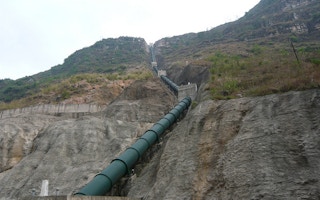At this year’s Eco Forum in Guiyang on the Wu River, a city in southern China that derives 70 per cent of its electricity supply from hydropower, the dominant theme was: “embracing a new era of eco-civilisation”.
Hosted by the central government in July, this is now an annual event which promotes international cooperation in sustainable development, drawing hundreds of policy specialists from around the world.
At last month’s forum in his opening speech Yu Zhengsheng, a senior member of the Chinese Communist Party (CPC), stressed that the central government will promote “a green development lifestyle and accelerate progress towards the new era”. The role of eco-civilisation in the country’s economic future was, once again, reaffirmed.
Ecological civilisation is the environmental slogan the Chinese government has promoted over the past few years. New research into eco-civilisation from the University of Melbourne’s Sustainable Society Institute, finds that China’s official rhetoric on ecological civilisation (that has followed industrial civilisation) has produced a new eco-minded, balanced, model of economic growth, which has opened-up a range of low-pollution policy options, while closing-off the high-pollution ones.
What’s more, through ecological civilisation China can help the world reach the goal of limiting global temperature to 1.5C above pre-industrial levels declared at the Paris COP21 in December 2015.
China’s old dominant discourse about industrial civilisation, which existed from 1978 to 2011, comprised the core “principle” of economy over the environment, or a GDP obsession to the relative neglect of ecological impact.
By contrast, ecological-civilisation, which first appeared as a buzzword around 2007, comprises the core principle of economy-environment harmony, or balance between economic development and nature conservation.
The new discourse
Later 2015, early 2016 is seen as the start of a period when eco civilisation dominates China’s definition of economic growth and informs high level policy initiatives.
In January, China’s National Energy Administration (NEA) announced that more than 1,000 existing coal mines will be closed over the coming year. Also that month, China’s Transport Ministry promised to “thoroughly implement the concept of ecological civilisation”.
In March, China’s 13th Five-Year Plan (FYP) was released and described as the “greenest FYP yet”. Premier Li Keqiang accompanying speech explained that “we need to protect the environment while pursuing development”.
And in June, the World Economic Forum described China a “green energy superpower” in view of its position as the world’s number one generator of solar and wind power.
Strengthening the Paris Agreement
International focus is on whether China can fast-track efforts to construct an eco-civilisation and accelerating the greenhouse gas mitigation ambitions of the Paris Agreement.
To do this, China could expand resource taxes, particularly on coal, to reflect the associated health and environmental costs. At present coal is very lightly taxed. This would not only help to secure a possibility to reach the aspirational 1.5C goal, but it would also deliver increased tax revenue for China’s central government, and perhaps reduce the need for ad hoc local fees and charges.
China’s nation-wide Emissions Trading System (ETS) – a tool whereby greenhouse gas emissions are traded — should be up-and-running in 2017. This market mechanism will potentially accelerate the adoption of cleaner sources of energy such as renewable energy and realise Beijing’s aspirational pledge of peaking GHG emissions in 2030 or earlier.
However, much will depend on just how the Chinese system is designed, how stringent it is, and whether it can be at some point linked together with other international cap-and-trade systems.
The chances of limiting warming to the 1.5C goal would be greatly enhanced if China were to implement deeper and more comprehensive low and zero emissions infrastructure financing and institutional reform.
While the country already plays a significant role in financing renewable energy technology, and is becoming increasingly cost competitive with high carbon alternatives, recommendation proposed by UNEP explain that this could be enhanced by establishing a green financial system in China, spanning: specialised investment institutions, fiscal and financial policy support, financial infrastructure, and legal infrastructure.
This story was originally published by Chinadialogue under a Creative Commons’ License and was republished with permission.
Read the full story.

















